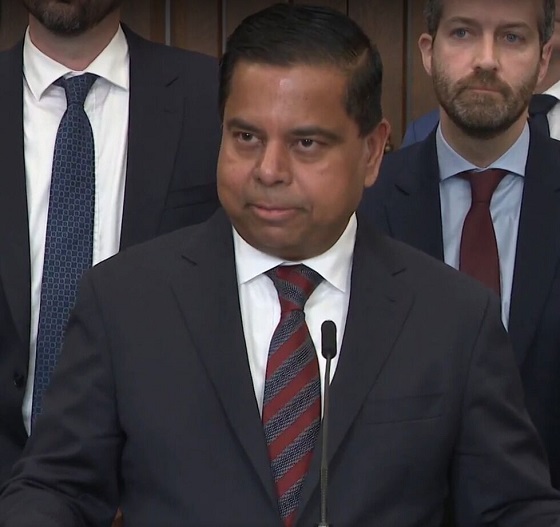Energy
Biden Has Taken More Than 200 Actions Against Domestic Oil, New Report Says

From HeartlandDailyNews
By
President Joe Biden and his administration have taken over 200 actions against the U.S. oil and natural gas industry as energy prices have gone up, according to a new report.
“President Biden and Democrats have a plan for American energy: make it harder to produce and more expensive to purchase,” the Institute for Energy Research states in a new report. “Since Mr. Biden took office, his administration and its allies have taken over 200 actions deliberately designed to make it harder to produce energy here in America.”
The analysis highlights actions Biden took on his first day in office, listing them chronologically through March of this year. The first act was canceling the Keystone XL pipeline, issuing a moratorium on all oil and natural gas leasing activities in the Arctic National Wildlife Refuge and revoking Trump administration executive orders that decreased regulations in order to expand domestic production.
Within a week of being in office, Biden issued additional moratoriums on new oil and gas leases on public lands or in offshore waters and imposed new regulations related to permitting and leasing practices, which were tied up in the courts for years. It was not until last month that a federal court upheld the first oil and natural gas lease sale on federal lands. Last December, the Fifth Circuit also ruled that Gulf lease sales must go forward.
Other actions ahead of the midterm elections include threatening to tax the oil and natural gas industry, blaming them for profiteering. Roughly six months before the general election, his administration has proposed $110 billion tax hikes on oil, natural gas and coal. In response, U.S. Sen. John Barrasso, R-Wyo., led a coalition of 24 senators expressing “grave concern” about his “continued hostility towards American energy production.”
IER published the report after the latest action taken to increase the cost of U.S. oil production and cancel plans to restock the Strategic Petroleum Reserve. The SPR has been depleted to roughly half of what it was when he first took office.
“President Biden had the chance to top up the SPR when prices were still low during the pandemic, but anti-oil-and-gas ideologues within the administration couldn’t bear to do anything that would help out producers when demand was low,” Kathleen Sgamma, president of Western Energy Alliance, told The Center Square. He then drained it “for political reasons and it’s long overdue to fill the SPR back up. Like many other politically driven decisions from this administration that distort energy markets, the government will have to spend more taxpayer money than if it had rational energy policies.”
Ed Longanecker, president of the Texas Independent Producers & Royalty Owners Association, told The Center Square that the Biden administration withdrawing approximately 250 million barrels from the SPR “was another dangerous example of putting politics over national security. The fact that some will believe the decision to cancel contracts to refill the SPR is due to a newly discovered fiscal consciousness is both nonsensical and alarming. Poorly conceived, albeit intentional energy policy results in higher costs for consumers, global emissions, and inflation, while putting our economy and energy security at risk.”
Daniel Turner, Founder and Executive Director for Power The Future, said instead of using American-produced oil to refill the SPR, Biden was “embracing insanity by putting the green agenda ahead of our families and our national security. Only in Joe Biden’s head does it make sense to lower costs by raising fees.” In light of Iran’s recent attacks against Israel, he said, “the world and our allies need a strong America that is fully utilizing our energy strength. Instead, the only things Joe Biden wants to strengthen is Iranian oil and Washington’s tax revenue.”
As the Biden administration imposes more fees on American oil producers, Iran’s oil exports reached $35 billion within the last 12 months, according to Iranian Labour News Agency. “Despite the reimposition of U.S. sanctions on Tehran in 2018, Chinese purchases of Iranian oil have allowed the country to maintain a positive trade balance,” Reuters reported. “Without oil exports, Iran would have registered a $16.8 billion trade deficit.”
U.S. House Republicans last month passed several bills and resolutions to strengthen the U.S. oil and natural gas industry, The Center Square reported. Only a handful of Democrats, largely from Texas, supported them.
Texas leads the U.S. in oil and natural gas production, having broken records in the last few years, The Center Square has reported. Because the majority of oil and natural gas is produced on private land and a bipartisan group of Texas elected officials and regulatory agencies are supportive of the industry, Texas has been able to achieve what most states have not.
Those in the Texas energy industry argue that, without their ingenuity and technological advancement, the U.S. would not be as energy independent as it is and prices would be higher. When the Russian-Ukrainian crisis hit, it was Texas LNG exports that provided a “lifeline” to European countries, a TIPRO analysis found.
“With so much uncertainty in the world, the need for reliable, responsibly produced energy from a stable trading partner has never been more crucial,” Texas Oil & Gas Association President Todd Staples said. “Texas is that trade partner. Our producers, pipelines, refineries, and exporters answer the call to alleviate the global energy crisis, made worse by war.”
He also argues that Texas’ production records “are not guaranteed. We cannot take for granted that this industry can continue to rewrite its record book in the face of federal policies blatantly designed to undermine progress. Delayed permits, canceled pipeline projects, closed and delayed federal leasing programs and incoherent regulations hurt American consumers and stifle our ability to deliver energy freedom and security around the world.”
Bethany Blankley is a contributor to The Center Square.
Originally published by The Center Square. Republished with permission.
Business
Carney’s Honeymoon Phase Enters a ‘Make-or-Break’ Week

From the National Citizens Coalition
The National Citizens Coalition (NCC) is sounding the alarm on a critical week for the Carney government, which, despite enjoying an unearned honeymoon in the polls, has delivered zero results for everyday Canadians. As the G7 summit looms large and the House of Commons prepares to adjourn, this is a make-or-break moment for Prime Minister Mark Carney to prove his government is more than empty promises. Canadians are watching, and the NCC is calling out the glaring failures that threaten a grim summer of economic decline, and continued crime, chaos, and rising unemployment.
Housing Minister Gregor Robertson Caught in $10.85 Million Scandal
Recent revelations from Blacklock’s Reporter expose Housing Minister Gregor Robertson’s attempt to conceal $10.85 million in personal property investments during Commons questioning. This shocking lack of transparency from the minister tasked with addressing Canada’s housing crisis raises serious questions about his integrity and ability to prioritize Canadians struggling with skyrocketing costs. While Robertson dodges accountability, and Carney apparently scoffs at providing housing relief to millions suffering under a Liberal-made crisis, young professionals and young families are wondering if they’ll ever have a chance to own a home bigger than Canada’s much-maligned supply of ‘dog-crate condos.’
The NCC demands a full ethics investigation, the resignation of Gregor Robertson — who, as one of the architects of the Vancouver housing crisis, should have never been handed this file to begin with — and immediate action to restore trust in this critical portfolio.
Pipeline Delays and Provincial Obstruction Threaten Economic Growth
The Carney government’s inaction on pipelines is stalling Canada’s economic potential. Despite promises of “nation-building projects,” British Columbia and Quebec continue to block and veto critical energy infrastructure, with Carney failing to assert federal leadership. His vague talk of “consensus” and “decarbonized” barrels has led to zero progress, leaving Alberta’s economy in limbo and Canadians facing higher energy costs. With no clear plan to advance projects, the government is squandering opportunities to create jobs and secure energy sovereignty. The NCC urges Carney to act decisively this week to break the provincial logjam and deliver results.
Immigration Chaos: Lena Diab’s Unchecked Honour System Fails Canadians
Immigration Minister Lena Diab’s reliance on an ‘honour system’ for millions of temporary visitors with expiring visas is a recipe for disaster. As Canada grapples with unsustainable immigration levels, Diab’s apparent plan for millions of temporary workers and failed ‘diploma mill’ attendees assumes compliance without enforcement, ignoring the high-propensity for fraud, and the ongoing and urgent strain on housing, healthcare, and public services. The Liberals’ Strong Borders Act promises reform, but its loaded with unnecessary overreach and vague measures.
A lack of urgency leaves Canadians vulnerable to further crime, chaos, closed emergency rooms, high rents, and failing infrastructure. With immigration continuing to spiral out of control, the NCC calls for concrete action to drastically lower immigration targets, expedite deportations, and prioritize Canadian citizens and the record amounts of unemployed before the House adjourns.
Canadians Deserve Results, Not More Hollow “Elbows up” or “Team Canada” Rhetoric
This week’s G7 summit in Alberta and the impending House adjournment are the Carney government’s last chance to show leadership, before an undeserved summer break for a government that will be overseeing deepening economic decline, rising crime under a refusal to tackle catch-and-release bail, and growing unemployment. Canadians cannot afford another season of unfulfilled promises and unchecked crises. The NCC demands Carney use the G7 platform to secure trade stability, meaningful energy deals with our allies, and table a federal budget to address the cost-of-living crisis made worse by inflationary Liberal spending. Failure to act now will cement an early legacy of inaction and leave Canadians to endure a prolonged period of hardship.
“The Carney government’s honeymoon has been built on hype, not results,” says NCC Director Alexander Brown. “From Gregor Robertson’s hidden millions, to stalled pipelines, to an immigration system in continued disarray, Canadians — and particularly young Canadians — are being let down. This week is Carney’s chance to prove he can deliver beyond the lies that were told to placate a portion of the electorate at the polls. If he fails to act, the economic decline, the crime and chaos, will only worsen, and everyday Canadians will pay the price.
“True Canadian leaders like Alberta Premier Danielle Smith are in attendance at the G7 along with Carney. If actual acts of ‘nation-building,’ and not more net-zero de-growth, do not come naturally to the PM, he should turn to those who have never wavered in their quest to make life more affordable for the hard-working citizens they are privileged to represent, and who know when to get out of the way to allow Canadians to prosper. More of the same internal, ideological sabotage from the Liberals cannot ruin this dire moment for Canada’s rebirth and recovery.”
The NCC calls on all Canadians to hold the Carney government accountable. Join us in demanding transparency, action, and results before the House adjourns and the G7 summit concludes. Together, we can fight for a stronger, more prosperous Canada.
About the National Citizens Coalition: Founded in 1967, the NCC is a non-profit organization dedicated to advocating for individual freedom, lower taxes, less government waste, and a stronger Canada. We hold governments accountable and fight for the interests of everyday Canadians.
Energy
Could the G7 Summit in Alberta be a historic moment for Canadian energy?

From Resource Works
Canada can be the democratic world’s top energy supplier, and the G7 Summit in Alberta is the perfect time to commit to that.
Canada is at the crossroads of opportunity as the leaders of the G7 convene in Kananaskis, Alberta.
An Ipsos poll has named Canada the top preferred oil supplier among G7 countries for the second time since 2023. No less than 68 percent of G7 respondents declared that Canada was among their top three choices to supply oil.
This should be yet another motivator for Canada to solidify itself as a key player in energy security and economic stability among the democratic nations.
The timing and location of this year’s G7 summit shows how important Canada can be to the world. Alberta, Canada’s energy heartland, is the source of nearly all of the country’s oil, and the provincial government wants more of it to reach global markets.
Those geopolitical anxieties caused by Russia’s invasion of Ukraine in 2022 have not disappeared, and Canada’s allies and partners like the European Union (EU), Japan, South Korea, and India are looking for a reliable and responsible partner to supply them with energy, and we are the best and most obvious choice.
Willing partners are easy to find overseas, but the other provinces and the federal government need to become equally enthusiastic first.
There is more to this than mere symbolism. Canada embracing its position as the most desirable supplier of oil makes complete sense.
In 2023, Ipsos found that Canada’s political stability, comprehensive environmental rules, and strong regulatory frameworks are why it ranked first among preferred oil suppliers. Norway is another popular option, but Canada has the advantage of better market access to the United States and the Asia-Pacific, along with established infrastructure and an open government.
It all combines to create a distinct advantage for Canada in the world of trade.
The US has slid as a popular oil supplier, to Canada’s advantage, and we need to capitalize on that more than ever.
As Russia’s bloody, disruptive war with Ukraine continues to drag on, the EU still needs sources of alternative energy to make a clean break with Moscow. Russia had previously served as the bloc’s effective gas station, albeit one armed with nuclear weapons.
G7 member states like Britain and the EU are looking to slap even stricter limits on Russian energy exports that go beyond what is already in place. Whatever Russia has to lose is Canada’s to gain.
Canada began to enlarge its export capacity last year with the completion of the twinning of Trans Mountain pipeline (TMX), enabling Canada to double the amount of oil it can pipe to Pacific markets. Shipping larger amounts of Canadian energy to partners in Japan, India, South Korea, and others has never been easier.
It was a monumental example of how investing in the right sorts of infrastructure can improve economic security, both nationally and internationally. Internally, developing the oil industry is a long term goal of First Nations leaders and communities.
The myth of First Nations opposing the expansion of oil and gas is one that needs to die. The Indian Resource Council, which represents over 130 First Nations, has repeatedly championed the responsible development of natural resources as a means of fostering economic independence and community renewal.
Many First Nations and other Indigenous groups have invested heavily into pipelines, production sites and storage facilities, and want to expand it further. In terms of pure economic value, there is not another industry that has created more wealth in Indigenous communities across Western Canada.
Complacency from the federal government and other authorities at this time could not be timed more poorly as the G7 Summit comes to Alberta. When the gathering ends on June 17, we should hope that it was a turning point where Canada made a direct and clear commitment to modernizing and expanding its oil and gas sector.
Our role in the world can be that of the great democratic alternative to Russia when it comes to supplying energy and other resources. Alberta knows it, as do our allies and Indigenous people across Canada.
Ottawa should listen. It is time to realize our potential to be an even greater energy superpower.
Through that, we can reduce the power of authoritarian, hostile regimes in the world by building a stronger, more unified Canada.
-

 Alberta1 day ago
Alberta1 day agoAlberta’s grand bargain with Canada includes a new pipeline to Prince Rupert
-

 Business1 day ago
Business1 day agoCarney’s European pivot could quietly reshape Canada’s sovereignty
-

 Bruce Dowbiggin11 hours ago
Bruce Dowbiggin11 hours agoWOKE NBA Stars Seems Natural For CDN Advertisers. Why Won’t They Bite?
-

 Crime2 days ago
Crime2 days agoManhunt on for suspect in shooting deaths of Minnesota House speaker, husband
-

 Energy12 hours ago
Energy12 hours agoCould the G7 Summit in Alberta be a historic moment for Canadian energy?
-

 Crime11 hours ago
Crime11 hours agoMinnesota shooter arrested after 48-hour manhunt
-

 conflict5 hours ago
conflict5 hours agoIsrael bombs Iranian state TV while live on air
-

 Aristotle Foundation9 hours ago
Aristotle Foundation9 hours agoThe Canadian Medical Association’s inexplicable stance on pediatric gender medicine



